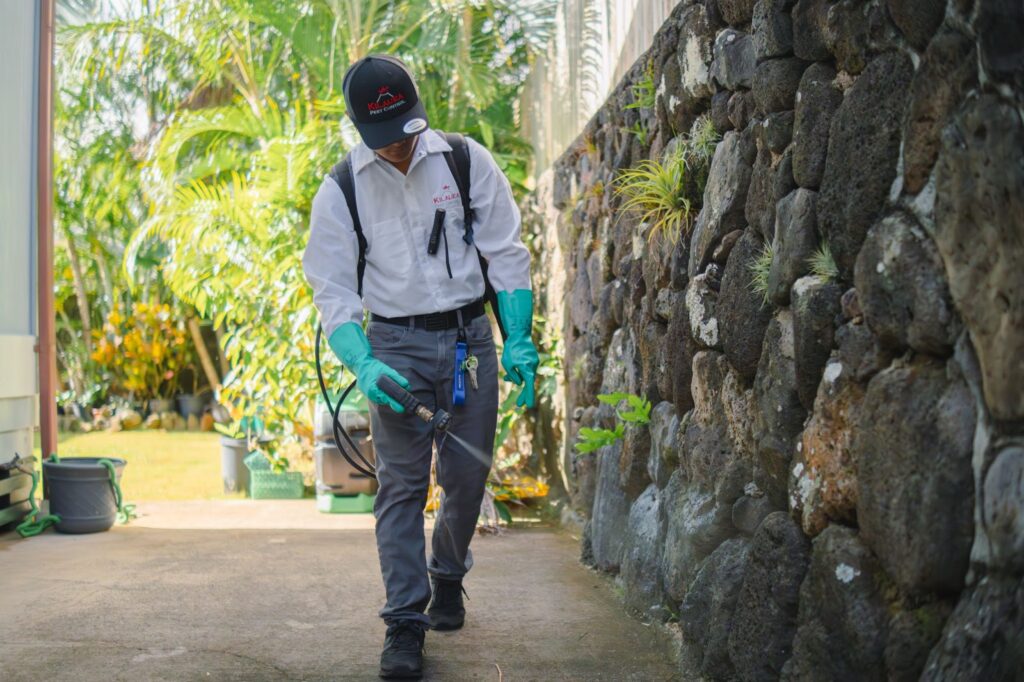It’s that time again. The trade winds are blowing, the sun’s hanging around longer, and you’ve finally got the motivation to deep-clean the garage. Spring cleaning in Hawai‘i is about refreshing your space, but we also want to remind you that it’s also an opportunity to kick out (or keep out) the bugs that think your home is a free space.
Pests love spring just as much as we do. So while you’re wiping baseboards and tossing out old boxes, here are some tips on keeping your home pest-free.
Why Spring Cleaning Matters for Pest Control
Bugs Love Clutter, Crumbs, and Cardboard
Spring is when pest activity picks up. Warmer weather and more moisture create the perfect environment for all kinds of creepy-crawlies to wake up and move in.
Common Springtime Pests in Oʻahu Homes
Here are the top spring offenders we see in homes across the island:
- Ants: Especially sugar ants, which show up uninvited the second a sticky spoon hits the counter.
- Centipedes: Not your average “bug”—these leggy predators love dark, moist spaces like garages, bathrooms, and under the laundry pile.
- Roaches: Still living rent-free in cardboard boxes and forgotten appliances. (We wrote a whole blog about them.)
- Termites: With spring approaching, Termite Swarm season is approaching. This is a good time to think about prevention methods or treatments against termites.
Smart Cleaning Hacks to Keep Bugs Out
Declutter With Intention
Cardboard absorbs moisture and gives pests places to hide and breed. Toss paper piles, old magazines, and junk drawers full of mystery items.
Decluttering also makes it easier to spot pest signs—like droppings, trails, or damage—before they become a bigger problem.
Deep Clean the Forgotten Zones
Behind the fridge. Under the stove. Inside the pantry. These are high-traffic areas for pests and low-traffic for our cleaning routines.
Spring is the time to bring out the vacuum hose and really go for it. Wipe down baseboards, sweep behind appliances, and check food storage for spills or expired items.
Seal & Repair As You Go
This one’s key: while you’re cleaning, look for entry points. Even tiny gaps around windows, door frames, or pipes can become a bug highway.
- Reseal cracks in walls
- Replace worn-out weatherstripping
- Fix leaky faucets and under-sink plumbing (moisture = bug magnet)
Yard Work Counts Too
Trim, Rake, and Sweep It Up
Look out to see if your garden is touching your home. Overgrown foliage and yard debris give ants, roaches, and even termites a way in. Keep vegetation at least 12–18 inches away from your exterior walls.
Got a wood pile or leftover lumber stacked near the house? Time to relocate it. This wood pile attracts termites and can lead them straight into your home.
Outdoor Water Sources = Pest Resorts
Standing water, clogged gutters, and leaky hoses are perfect for pests. Centipedes, mosquitoes, and roaches all thrive in these spots. Fix leaks, clear drains, and give your yard a chance to dry out.
When to Call in the Pros
You’re Seeing More Bugs, Not Less
You decluttered. You deep-cleaned. You even wiped behind the toilet. But the ants are still coming—or worse, you spotted a centipede slinking through your bathroom at 2 AM.
If the bugs keep showing up, it might be time to bring in the professionals.
Preventative Treatments Work Best in Spring
This is actually the best time of year to book a general pest service. Stopping pests before they settle in means fewer issues down the road. Our technicians know exactly what to look for and where to treat, inside and out.
Plus, we don’t do one-size-fits-all. Every home in Hawai‘i is different, and we’ll treat yours like it.
Get Ahead of the Bugs
Spring cleaning isn’t just about aesthetics—it’s your first line of defense against pests. By decluttering, sealing entry points, and clearing the yard, you’re setting up your home for a pest-free season. And if you need backup? We’re right here.
Let Kilauea handle the bugs—so you can enjoy your clean and comfy home.
Ready for a bug-free spring?
Schedule your service today or call us at (808) 236-2847.











